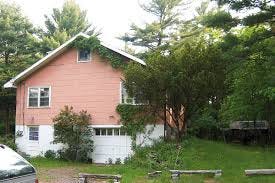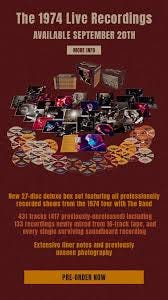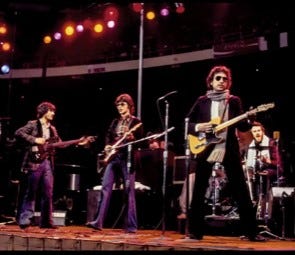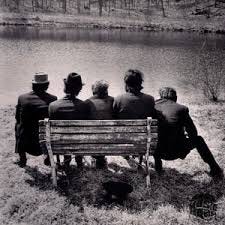Hey, Bob: What about The Band?
431 tracks from historic 1974 tour out Friday. But no Band cuts?
On Friday, we’ll see the long-awaited, often-doubted, official release of a veritable ton of live recordings of Bob Dylan and The Band from their historic 1974 tour. As the ad says: “The 1974 Live Recordings celebrates the 50th anniversary of Bob Dylan’s return to touring that year. Featuring all professionally recorded shows from the artist’s 1974 performances backed by The Band, the collection will be available as a deluxe box set across 27 CDs…and every single surviving soundboard recording.”
Geez, you hate to quibble with such a generous — if pricey —blast of historic Dylan material, which Rolling Stone’s Andy Greene explained, is only happening due to a quirk in European copyright law which would make the material in the public domain. (In other words, free!)
Whatever the reason all this music is finally appearing, as I wrote the other day, I got to see the Boston show and it was fabulous. But is it wrong to note that The Band ALSO performed their own songs on that tour? Would including their numbers have been too much of a hassle? Were there legal reasons with all their estates, since all of them are dead, except Garth Hudson? Would including all The Band songs have pushed the total number of CD’s out of sight? It’s already at 27 and the price just way too much? Or have we already heard enough from The Band?


In his fascinating book about The Basement Tapes, originally called “Invisible Republic,” Greil Marcus suggested someone called the music Bob and The Band played in Big Pink “deserter’s music.” That’s what I mean by the music being timeless. You don’t hear an America torn about the Vietnam War or civil rights or countless other issues of the day. You sense a respect for tradition, for old-time values, even in the way they dressed and carried themselves, putting their families inside the album jacket, the mystery that cloaked their debut, photos of their backs, crowded onto a couch.
It may be unfair to expect such continued breakthroughs. Maybe it was the way society itself changed. Life in America in 1970 seemed a lot different than it did in 1968. But the subsequent records, as good as some of the individual songs were, just didn’t have the kick, the leap forward that the first two did. Is that why they left The Band off this massive set?
It’s a good question, I suppose. Do we need it? The Band’s “Rock Of Ages” is already one of the finest of all live albums, their performance at the Academy Of Music on New Year’s Eve 1971 is definitive and while calling it “Rock Of Ages” might seem like a brag, especially since to that point, they’d only done four albums but in retrospect, they were correct. It has endured. That was 1971. They recorded for five more years.
Recent re-releases of The Band’s catalog like their third studio album “Stage Fright” included a stellar live concert recording from London’s Royal Albert Hall in June of 1971, just a few months before the release of their fourth album “Cahoots.” And the re-release of “Cahoots” also included a live concert from the Olympia in Paris, also in 1971. There were five more years to go.
Of course, “The Last Waltz” is a fabulous tribute to the group, filmmaker Martin Scorcese capturing the final time they’d played their classic songs with leader Robbie Robertson in the fold on Thanksgiving Eve, 1976 at Winterland in San Francisco. If you haven’t seen it, it’s absolutely a film to treasure.
Yet to me, even after all the wonderful music they gave us, nine albums (with Robbie) — not counting The Basement Tapes or Planet Waves with Bob — their first two albums were so groundbreaking, so against-the-grain of the rock and roll of the time, as Robbie once said, “We were rebelling against the rebellion,” I wish the records that followed were as ahead of the curve. Maybe that was an unreal expectation.
With three amazing singers in Levon Helm, Richard Manuel and Rick Danko, a peerless instrumentalist in Garth Hudson and an imaginative, gifted songwriter and arranger in Robbie Robertson, I wish the five of them were as into the songs, into contributing their own ideas in the records that followed those first two. It seemed as if those first two were genuine Band records — that is, they all pitched in, a truly collaborative effort. Whether it actually was or not, who knows?
When “Music From Big Pink” and “The Band” came out, the albums were so different, so out of time — and I mean that as a compliment — it would have been amazing to see where they could have gone. And it wasn’t like the remaining records were flops. But neither “Stage Fright” or “Cahoots” or “Moondog Matinee” or “Northern Lights, Southern Cross” were a match for the first two, were they?
It always seemed ironic to me that unlike most other rock and roll bands in 1968, The Band dressed like adults, grown-ups. Short hair, their father’s clothes, mustaches. No flash, no glitter. If you want the truth, they looked like squares!
But, of course, they weren’t. It seemed that once they got famous and got the money and the excesses that came with it (namely drugs and aberrant behavior!) — they acted like teenagers. When they originally made the move to Stoll Road in Woodstock — trust me when I tell you it was an out-of-the-way place — it was as if the five of them collectively heard a kind of music that was theirs, a music they could only create in their own place in the universe. Even if they had to go up in the middle of nowhere in the midst of an out-of-control world to find out what was there. And Bob Dylan wanted in, too. He was a regular visitor that summer, contributing all sorts of wild, crazy, delightful songs that obviously inspired and fueled The Band’s own songs some time later.
There are those who say they resent Robbie taking over. With three drug addicts in the group for what seems a good part of their existence — from all accounts — somebody had to be in charge. And from what I’ve read, just trying to get everyone in gear, in the studio at the same time was, often enough, a struggle.
Not that The Band turned out crappy records, well, not until “Islands.” There was just too much talent in that group to turn in lame stuff. Even their late “Moondog Matinee” — an album of 50’s covers that were immaculately performed — was first-rate but not original. I’m not sure even Robbie would suggest that the majority of the songs he came up with after the first two albums were quite as razor-sharp, as profound as that first batch. You know, it might be that old saw, ‘You get 10 years to write your first two albums, then six months for the third.”
Songs like “It Makes No Difference” and “Acadian Driftwood” were brilliant as were a few other songs as their career wound down. As performers (I saw them three times, once with Bob, twice on their own) their shows were crisp and consistent.
But as good as they were, they never quite had their career take off. Though they performed a solid set at Woodstock, they were left out of the film. As talented a group as they were, once they were on the cover of Time Magazine, it’s hard to say their work kept on climbing like, say, a Bruce Springsteen, who was on the cover of Time AND Newsweek the same week with “Born To Run,” then saw his career really take off.
Maybe in those first two albums, they had their say. As is made clear in “The Last Waltz,” they had plenty of time on the road before they made “Music From Big Pink.” Once they said their piece, maybe collectively they backed off and said, “OK, Robbie, you take over” and he did what he could the rest of the way. “You sing this, Richard you come in here, Rick, you’re next.” “OK, Boss.” They were so talented, collectively. I wish they’d done a bit more. They certainly had it in them.
Don’t get me wrong. I love The Band and still play all their records. I do think it’s unfortunate that we don’t get to hear at least a few of their sets in the forthcoming Bob Dylan box. They had a bunch of great songs, too. It was a huge tour for them, too. Besides, you know, just supporting songs performed by Bob Dylan.







Bravo! Excellent writing and wonderful story of the Band. I'll bet Grossman had as much to do with cutting them out of the Woodstock movie than anything. I, too, wish the Band's sets would have been included. All of them. I'm not getting out of here alive, so I don't mind the price so much, but I'd have paid double for having the Band on this release. Thank's John for your writing, well done.
Enjoyed this. I follow another Substack (Flagging Down the Double E's) that looked at the entire 1974 tour and was unimpressed overall by the group's sets. (Drugs, boredom, etc.? Unsure...) Wish they'd been on the set as well, but the legal entanglements involved will ensure that doesn't happen. I'll be curious to see if Universal does anything with their stuff given the EU law, but I somehow doubt it.